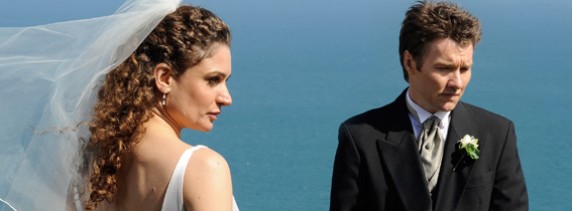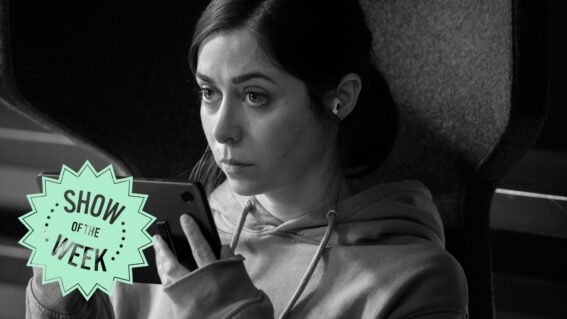‘Separation City’ Interview, with director Paul Middleditch

Best known for his work on commercial campaigns, most notably Sky TV’s little and large series of ads, director Paul Middleditch’s third feature film is the first shot in his native New Zealand. Garnering strong reviews and billed as the grown-up comedy-drama Generation X Kiwis have long been waiting for, Separation City is a bittersweet story about falling out of love for the first time. Flicks talked to Middleditch about City, casting and coming home.
How did you get involved in making Separation City?
Tom (Scott, the writer) had seen my work and he loved my Sky TV campaign with the little guy and the big fella. He rang me one day, introduced himself and sent me the script. I thought it was genuinely funny but also had real heart to it. It was also confronting but mature at the same time. He’s known for not beating around the bush, as well as being subversive, when it comes to writing about relationships and politics, but he also exposed a very emotional and sincere view of a lot of his life experiences. For instance, the character of Harry is very much him. I had also done two author-based features which you’d call art films and this was very more a commercial proposition, which attracted me to it. As I worked on it, I knew I’d made the right choice because I realised there was an enormous amount in the film that I could relate to from my own experience. Apart from the affairs, that is. That enabled me to bring a lot of personal emotion to the picture which I think was a vital thing in terms of its essence.
How much were you involved in the casting?
To help raise the finance for the picture, the international sales agent wanted a cast they could sell the film with. As a leading man, Joel Edgerton was chosen not only because he’s one of the top four Australian actors worldwide but also because he could help open the film in Australia. Likewise we needed a German actor (Thomas Kretschmann) because of the involvement of German money. However, I also wanted to work with as many New Zealand actors as I could and that’s how my friend Les Hill, who I’ve collaborated with on commercials for 10 years with, got to be cast as Harry. Tom had a very specific idea about the tone of who Harry was and he was thrilled with Les. ‘He’s the perfect Harry. He’s a better Harry than I could ever be,’ he said, which was very satisfying.
What was it like shooting in your home town (Wellington)?
I love shooting here and I wanted to do something that showed the town off with a lot of affection. Sometimes we needed huge barricades and buffers to cut the wind off but generally the weather was pretty kind to us. And in fact during the last scene the wind actually really helped us, it came screaming down Wellington Harbour just at the time we needed it, adding drama to that scene.
Any differences between working in New Zealand and Australia?
Not really. I think we’re really very similar, especially when it comes to sense of humour. Interestingly, a lot of New Zealand work is made in Australia and vice-versa. For instance I made The Big Ad, Australia’s most famous ad, for Carlton Draught in 2005, in Queenstown! So, amusingly, it is full of Kiwis.
What are the benefits of a commercial background when it comes to tackling a feature film?
What you bring to it is a sense of continually working and experimenting. I work with actors all the time and for me it’s all about storytelling and performance rather than visuals. And of course the more you do that the more experience and wisdom you get as director. The most match-fit directors around are the ones that keep playing and I think that’s a lot of the reason why commercial directors are in such demand for feature work. Of course it’s not a new phenomenon either, Hugh Hudson and Ridley Scott were making award-winning films like Chariots of Fire and Alien almost 30 years ago. I guess that now the mediums are feeding more in and out of each other. It’s very interesting that more and more fine actors are also working more in TV commercials. They used to be dismissed and derided. Now there are some great pieces of work that are getting seen worldwide thanks to the internet. People are now realising that a good ad is a great thing.
What were your aims in making the film and what do you think of the end result?
I really wanted to play it very straight. I wanted to make a film about an area of sophisticated New Zealand culture, a film that celebrates a maturity and a world that’s real that isn’t always reflected in our cinema. I also wanted it to be as dramatic as it is amusing. I think that’s what I’m most proud of, that it has substance. I think that’s one of the reasons why it has been so well received so far. Now I’m hoping that will find an audience in Australia, because I would love it if a New Zealand comedy worked over there.
What projects have you got in the pipeline?
There are a couple of New Zealand films (a comedy and a drama) that I’m looking at, as well as some stuff in American and Australia.
Separation City is now playing in cinemas. Read more on the film and see session times or watch the trailer.

















